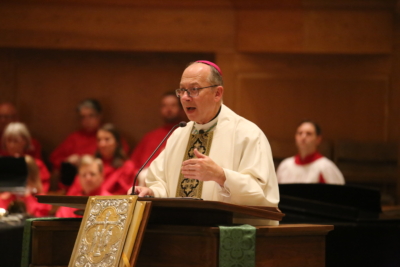
Bishop Knestout delivers his Mass for Hope & Healing homily. (Photo: Deborah Cox)
Homily: Mass for Hope & Healing, St. Bede Catholic Church
October 6, 2022
First Reading: Ezekiel 34:11-16
Second Reading: Colossians 3:12-17
Gospel: John 10:11-18
The prophet Ezekiel: he was an unusual prophet. He often conveyed his prophetic messages through signs and symbols, rather than with words. When he did speak, his words were filled with mystical visions of the majesty of God.
He was a prophet living during the end of an era in Israel, the time immediately before the Babylonian Captivity. He continued his prophetic work while the people were in exile in Babylon.
Because of this, he was someone who witnessed and warned of the fall of his people and the consequences of their sins and their failures.
Yet, like all the prophets, no matter how hard their message was to hear, and how much doom they witnessed, they always spoke with hope about the future. God has a plan for the salvation of his people, no matter how much they fail to live according to his plan.
His plan eventually is fulfilled in the Pascal Mystery of Christ and the sending of the Holy Spirit so that God would no longer dwell with his people only, as he did in the Old Testament, in one place, one temple in Palestine. He would dwell in each heart and help each person to seek forgiveness, experience new life, and remain faithful to his grace throughout all our lives.
This passage today does not come from the earlier part of his book of Ezekiel that prophesied doom for God’s people. It comes from the later part of the book which expresses hope for restoration. Restoration in the future, after the time of penance and exile are concluded, and all the previous generations who had failed in their devotion, had passed from this life.
The passage today comes after a bitter indictment of the bad shepherds, those among the priestly, prophetic, and kingly classes, who fail to care for God’s people as he intended. Our renewed hope comes from God’s words heard today – that he himself will shepherd and care for us, his people. He draws close to us in all our circumstances.
We gather today because it is important for us, as a Church, to not become complacent about or gloss over the failures of the past. I again confess that we as shepherds failed to care for the People of God as we were called to do and as God intended for us to do. To anyone who was harmed or injured by the sexual abuse of clergy, on behalf of the church of Richmond, I express my sincere sorrow and apologize. This should never have happened in the Church.
We allowed horrific actions to take place and we failed to act decisively to protect the young and vulnerable. We admit these failures and ask forgiveness for them.
Ezekiel reminds us that no matter how terrible the failures may be, God has love for his people, and he will find a way to properly care for them.
We pray today for renewal in the dedication and integrity of all those called to provide oversight for God’s people, that we might guide the Church faithfully and competently, teaching, leading others to holiness, by giving example with personal lives of holiness ourselves, and we recommit to act with integrity and charity toward all God’s people, especially the young and vulnerable who are in our midst.
Jesus is the Good Shepherd who will lead the Church to where it should always be – a place where all people find safety, refuge and new life in the teachings and sacraments of the Church.
The second reading, St. Paul’s reading to the Colossians, a people in Asia Minor, what is now Turkey, who experienced a mixture of pagan, Greek, Roman, and Jewish influences, and beliefs. St. Paul’s writes to the small Christian community there, to encourage them to not allow pagan ideas or practices to hold sway over them.
Paul makes clear, that there is primacy and power in Christ as the Son of God over all these ideas and practices. There is no other mediator between God and men. It is only to him that we turn and find salvation and knowledge of God.
It is sometimes possible for us to be overwhelmed with the power of sin and the damaging actions that one person can do to another. Harmful acts of abuse and manipulation may seem to have a great power. But St. Paul reminds us, and the Colossians, that all power and authority over sin, death, and the destiny of all men are in Christ himself.
The passage we hear today is drawn from an early baptismal instruction. These are words used to instruct those about to be, or who were newly baptized into the community.
These words outlined the expectations for the Christian life, and the interior change expected of the newly baptized, as well as the virtues that should be evident in anyone who received the new life of baptism.
This passage comes toward the end of Paul’s letter and is an exhortation for the Christian life. At times when we fail due to sin, we can all benefit from a renewal in mind and heart, to begin again and truly and fully live the life God calls from us.
After sin and scandal, the Church needs recommitment to its baptismal calling. It is only by living fully these virtues, these spiritual fruits of the Holy Spirit that we could ever hope to overcome the sins of the past. Heartfelt compassion, humility, kindness, and gentleness are the qualities expected of the disciple, and found in the life of Christ. So, it is for us today to recommit to fully live the life of Christ.
The portion of John’s Gospel we hear today is a formal accusation of the Pharisees who are not good shepherds. This is because they have their own interests at heart, not that of God’s people.
Jesus knows the sheep. Jesus’ love is all inclusive. It embraces those beyond Israel and extends to the entire world. It extends not only to those who feel connected and remain close to the Church, but his love and his voice reaches out to all people, even those who have difficulty hearing the Good News because of the failures of the bad shepherds. Jesus, as the Good Shepherd, overcomes this damage through his pascal mystery. He lays down his life for all of us.
Because of the pascal mystery, and the gift of salvation, there is firm hope that the Church can recover and grow. It, once again, can express the fullness of what it means to be the Body of Christ, and for us to be disciples. The Church can and should always be a place of forgiveness, refuge, life, and holiness, to all who experience her embrace.
It is not our power or abilities, nor our commitments, or even our continual efforts which will bear the fruit of new life. Relying solely on our own power will eventually fail. The fruitfulness of our efforts, for all in the Church is found in the life, death, and resurrection of Christ. It is here that we must always turn, and return, to find forgiveness, new life, and the grace to begin again. It is then that our efforts will bear the fruit of justice and peace.
May all those who have experienced any form of abuse and harm from a trusted person, like a priest, consecrated brother, religious sister, teacher, coach, family, friend, or parent know that in Jesus, the Good Shepherd, we will always find refuge, healing, and peace.
